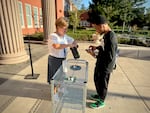To lunch or not to lunch. That is the question.
The Portland Public Schools governing board is entering the final stage of enacting a new, districtwide policy limiting students’ use of cellphones. If passed, all students in Oregon’s largest school district — regardless of grade — would need to have their phones, smartwatches and other personal electronic devices off and away during school hours.

Vice Principal Jessika Magnett helps students with their Yondr cellphone pouches outside Grant High School in Portland on Wednesday, Aug. 28, 2024. It was the first day of school for the entire student body after ninth graders got a jump-start day on Tuesday.
Natalie Pate / OPB
The proposed policy comes with some exceptions, particularly for students with disabilities who need personal devices to communicate or access their education, and for approved academic activities or programs. Students who don’t follow the policy would be subject to the district’s standing discipline guidelines and could have their devices confiscated.
Nearly everyone in the district, from students to parents, teachers to administrators, generally seems to agree that phones shouldn’t be used during class.
There are concerns about families being able to reach students in cases of emergency. But proponents of limited cellphone use — and administrators from individual schools with restrictive policies in place already — have tried to show how such concerns can be managed.
There was pushback, especially from students, who argued for allowing phones during passing periods. But Portland’s proposed policy already overruled that and wouldn’t allow phone access at those times.
Where opinions differ the most, though, is whether a districtwide policy should also prohibit students’ access to their devices during lunch, including high schoolers who are allowed to go off campus to eat.
With a 4-3 split vote on an amendment Tuesday night that added lunch in the required ‘off and away’ time for all students, the Portland school board ultimately decided to keep cellphones away all day. Student representative to the board and McDaniel High School senior JJ Kunsevi used his symbolic vote Tuesday to speak against the lunch restriction with a “strong no.”
Districts and state agencies nationwide are grappling with cellphones policies in schools.
Last year, Florida became the first state to ban public school students from using cellphones in class. Several more states this year have either passed similar legislation — or considered it. The national conversation largely blew up this year after the publication of “The Anxious Generation: How the Great Rewiring of Childhood is Causing an Epidemic of Mental Illness” by Jonathan Haidt. Policymakers across the country have cited it as their reason for acting now.
Oregon Gov. Tina Kotek has said she would support a statewide approach, and the Oregon Department of Education released recommended guidelines in October.

Students store their cellphones while attending class at Grant High School in Portland, Ore., Oct. 3, 2023. The school opened in September, 1924, and is in the Portland Public Schools district.
Kristyna Wentz-Graff / OPB
Portland’s school board policy committee has been reviewing pilot programs at local schools, listening to public comments and considering research over the past several months.
Some PPS schools have already put stricter cellphone policies in place this year, such as Grant High School’s new Yondr pouch requirements.
The school board’s policy committee worked with district administrators and the student representatives to the board in the spring and this fall to survey students across the district. More than 2,000 responded. They also got feedback from the schools with stricter policies this fall as pilot programs, including Grant.
The majority of students, explained board member and committee lead Julia Brim-Edwards, wanted device-free classes. Lunch was the key issue.
Tuesday night, Brim-Edwards, Gary Hollands and Herman Greene were the ones opposed to a cellphone ban at lunch.
“You ask the question of … ‘Why would we want them to have it during lunch?’ ” Greene said in response to a question posed earlier in Tuesday night’s discussion by fellow board member Andrew Scott. “I would say, probably for the same reason that you look at your phone during lunch — to see what’s going on, to check up on what you’ve missed, to get caught up before you have to go back to work.
“I mean, if we’re teaching our kids to be responsible,” he added, “then let’s teach them to be responsible.”
Board members who supported the added lunch restriction argued it’s more consistent and equitable to keep the phones away all day, at all schools across the district, rather than make individual schools decide if they wanted to add that restriction themselves.
That echoes sentiments heard from educators and administrators for weeks in favor of a districtwide policy in general — there needs to be a set standard coming from the top; otherwise, it can be more easily hit or miss on how it’s implemented or whether it has any teeth to it.
They also hope that keeping phones away during lunch will encourage more face-to-face socialization and create more seamless transitions when students go back to class in the second half of the day.
And they pointed to previous comments shared that lunch is often an unsafe time for students, the most common time for students to use their phones to bully their peers, fight or make drug deals, which some board members brought up.
“This is a start,” said board chair Eddie Wang, who wrote the amendment. “Right? By having a uniform policy, now we know where to start and how to do it. It is a culture change.
“The current system is not working.”
The board discussion Tuesday night was not the final step.
The board approved an amendment Tuesday night, which changes what language the board will vote on in the coming weeks. But the vote does not approve the overall policy or put it into effect just yet.
The next step is a 21-day public comment period leading up to a second reading and vote on whether to approve the policy in full. That’s likely to happen in early January.
Read the amended policy, staff report and other board documents here.
